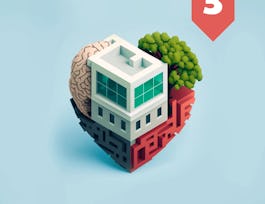Human rights are under pressure in many places across the globe. Peaceful protests are violently quashed. Voting is tampered with. And minorities are often excluded from decision-making. All of this threatens the ideal of an open society in which each of us can be free and participate equally. A solid protection of human rights is needed for an open society to exist and to flourish. But it is often an uphill battle to work towards that ideal. Equip yourself and learn more about what human rights are and how they work.

Human Rights for Open Societies
Taught in English
Some content may not be translated
45,182 already enrolled
(497 reviews)
Details to know

Add to your LinkedIn profile
16 quizzes
See how employees at top companies are mastering in-demand skills


Earn a career certificate
Add this credential to your LinkedIn profile, resume, or CV
Share it on social media and in your performance review

There are 6 modules in this course
The protection of human rights is closely linked to the idea of open societies. In an open society, people enjoy freedom and they are to a large extent free to live their lives as they wish. This week, we explore the idea of open societies and see how it relates to the protection of human rights. We also introduce you to the European Convention on Human Rights. This document forms the foundation for one of the world’s most intricate international human rights systems. Finally, you learn about the background and history of the Convention, the rights that are protected therein and the procedure which individuals can use to lodge a complaint with the European Court of Human Rights.
What's included
3 videos6 readings4 quizzes
When someone complains that his or her right to privacy or right to freedom of expression has been violated, the European Court of Human Rights has to assess whether that is truly the case. But how does it do this? In this part of the course, we will focus on the general principles and methods the Court uses in order to assess whether a State has violated the Convention. We will see how the Court approaches human rights cases and learn about the dilemmas it faces in this regard in the context of open societies.
What's included
5 videos2 readings5 quizzes
Open societies require a democratic form of government. But how are human rights and democracy linked? In this part of the course, we focus on what democracy entails from a human rights perspective. We also address what voting rights are and how political parties are protected under the European Convention on Human Rights. Finally, we take a look at the protection of political rights in countries in transitions from war to peace and from dictatorship to democracy.
What's included
3 videos2 readings2 quizzes1 peer review
Open societies are all about inclusion. In an open society, everyone should be allowed to participate on an equal footing. No one should be excluded. Equally, human rights should be enjoyed by all people and discrimination is prohibited. Yet, even in an open society, universality of human rights and the prohibition of discrimination may raise many questions. For example, what about the rights of people who are not (yet) citizens of that society, such as asylum seekers? On the one hand, asylum seekers find themselves in the extremely difficult and vulnerable position of being in transit. For that reason, their needs deserve extra consideration. For example, they may need special protection against hostile responses by the local population, they may need food, education and housing, and they must be protected against discrimination. On the other hand, not being citizens, the question is often raised to what extent they should be included and benefit from the rights and freedoms guaranteed in the European Convention on Human Rights. Finding the right balance and solving such dilemmas is crucial in open societies. In this week, we focus on (1) the rights and freedoms of insiders and outsiders under the European Convention, (2) non-discrimination and (3) the protection of vulnerable groups. To illustrate, we pay special attention to the rights of migrants and asylum seekers, as well as of other minority groups.
What's included
4 videos2 readings2 quizzes1 peer review
The right to freely express yourself, the freedom of the press to report news and the right to protest are essential in an open society. The freedom of expression enables you to gather information about public issues and to let others know what you think. The media plays an important role in conveying information about matters of general interest. And public protest enables you to publicly support a cause you believe in. Together, these rights provide the essential conditions for the free and peaceful sharing of thoughts and ideas. Nevertheless, the unlimited freedom to say whatever you want and the freedom to protest might also undermine the openness of society. Hate speech and discriminatory speech, for example, might contribute to the exclusion of minority groups. In this learning unit, we take a closer look at the right to freedom of expression and the right to freedom of assembly. Thereby, we also address the limits of these rights in an open society.
What's included
3 videos2 readings2 quizzes
This is the final assignment of the course on Human Rights for Open Societies. In this assignment, the various topics of the course are brought together. The first aim is to help you test the knowledge and insights you have acquired during the course. The second aim is to help you understand the interrelatedness of the main topics discussed.
What's included
1 reading1 quiz1 peer review
Instructors



Offered by
Recommended if you're interested in Law

Rutgers the State University of New Jersey

University of Geneva

University of North Texas

Universitat Autònoma de Barcelona
Why people choose Coursera for their career




Learner reviews
Showing 3 of 497
497 reviews
- 5 stars
83.50%
- 4 stars
12.27%
- 3 stars
2.61%
- 2 stars
0.60%
- 1 star
1%

Open new doors with Coursera Plus
Unlimited access to 7,000+ world-class courses, hands-on projects, and job-ready certificate programs - all included in your subscription
Advance your career with an online degree
Earn a degree from world-class universities - 100% online
Join over 3,400 global companies that choose Coursera for Business
Upskill your employees to excel in the digital economy
Frequently asked questions
Access to lectures and assignments depends on your type of enrollment. If you take a course in audit mode, you will be able to see most course materials for free. To access graded assignments and to earn a Certificate, you will need to purchase the Certificate experience, during or after your audit. If you don't see the audit option:
The course may not offer an audit option. You can try a Free Trial instead, or apply for Financial Aid.
The course may offer 'Full Course, No Certificate' instead. This option lets you see all course materials, submit required assessments, and get a final grade. This also means that you will not be able to purchase a Certificate experience.
When you purchase a Certificate you get access to all course materials, including graded assignments. Upon completing the course, your electronic Certificate will be added to your Accomplishments page - from there, you can print your Certificate or add it to your LinkedIn profile. If you only want to read and view the course content, you can audit the course for free.
You will be eligible for a full refund until two weeks after your payment date, or (for courses that have just launched) until two weeks after the first session of the course begins, whichever is later. You cannot receive a refund once you’ve earned a Course Certificate, even if you complete the course within the two-week refund period. See our full refund policy.
